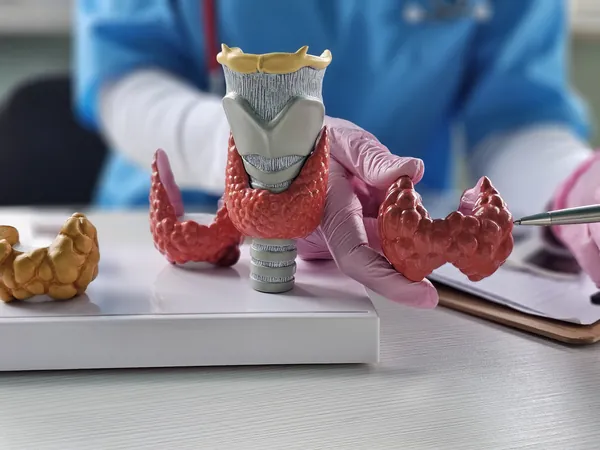
Rethinking Papillary Thyroid Cancer: Why 'Low Risk' Might Not Mean Low Consequences!
2025-05-14
Author: Emily
If you think papillary thyroid cancer (PTC) is just a minor inconvenience because it's often labeled as 'low risk,' think again! Oliver Bathe, a prominent Professor of Surgery and Oncology at the University of Calgary, is calling for a major rethink on this common cancer diagnosis that, paradoxically, can carry hefty consequences.
Papillary thyroid cancer is the most prevalent form of thyroid cancer, and incidences are mushrooming in developed nations. Often dubbed a 'good cancer' due to its slow growth and high survival rates, this term can mask the real struggles that patients face when making treatment decisions.
The Hidden Dangers of 'Low Risk' Diagnosis
Despite the optimistic statistics, there’s a worrying reality: while most patients don’t see their cancer return, around 10-15% will. Unfortunately, we currently lack the tools to accurately predict which patients are at higher risk for recurrence before they undergo surgery. This leads to significant challenges for both patients and healthcare providers.
Why the Current Treatment Approach Falls Short
Treatment decisions for PTC are primarily based on what doctors can see through imaging and subsequent biopsy results. These include factors like tumor size and cellular characteristics—an outdated system that has some serious pitfalls. Firstly, it's not very accurate: many individuals labeled as 'low risk' experience recurrence, while others are subjected to unnecessary aggressive treatments.
Secondly, crucial diagnostic information often only emerges after surgical intervention, leading to critical choices being made in the dark regarding tumor behavior. The result? Many patients undergo total thyroidectomy—removal of the entire thyroid—even when less invasive options might suffice. Some find themselves back on the operating table due to risk factors identified post-surgery. All of these unnecessary interventions come with emotional and financial tolls that could be mitigated with better pre-surgery risk assessment.
Enter Thyroid GuidePx®: A Game-Changer in Diagnosis
But here's a ray of hope: the new molecular test, Thyroid GuidePx®, is set to revolutionize how we approach thyroid cancer diagnosis and treatment. Moving beyond just tumor size and appearance, Thyroid GuidePx® digs deeper into the genetic factors associated with recurrence risk.
This innovative test analyzes RNA from tiny tumor samples, either from a biopsy or during surgery, using a sophisticated machine-learning model to classify tumors into three distinct molecular subtypes. This classification is crucial, especially for tumors smaller than 4 cm, and can significantly influence treatment strategies:
- **Type 1 Tumors**: Extremely low risk of recurrence.
- **Type 2 Tumors**: Intermediate risk but generally favorable outcomes.
- **Type 3 Tumors**: High likelihood of recurrence, despite small size on imaging.
How Thyroid GuidePx® Revolutionizes Treatment Decisions
With reliable risk assessments before surgery, Thyroid GuidePx® empowers patients and physicians to make well-informed choices from the get-go. Here's how:
- **Tailoring Surgical Options**: If a tumor is deemed low risk, patients may opt for a lobectomy (removal of half the thyroid) instead of a total thyroidectomy, significantly lowering surgical risks and the chances of lifelong hormone dependency.
- **Exploring Conservative Alternatives**: For very low-risk cancers, patients can consider active surveillance—monitoring the condition without immediate surgery—or radiofrequency ablation, a non-surgical option.
- **Reducing Unnecessary Treatments**: For those needing total thyroidectomy, Thyroid GuidePx® can clarify whether radioactive iodine treatment is necessary—an essential distinction in the hazy intermediate risk category.
- **Boosting Patient Confidence**: Understanding one's recurrence risk diminishes the anxiety and uncertainty many patients experience, fostering a more collaborative approach in clinical decisions.
A Timely Innovation for a Growing Health Dilemma
As rates of thyroid cancer, particularly among young adults, continue to rise, the long-term consequences of overtreatment—such as surgical complications and financial struggles—can be daunting. Thyroid GuidePx® is a significant stride towards precision medicine, customizing treatments based on each individual's cancer biology. Integrating this revolutionary test into standard clinical practice could drastically reduce unnecessary interventions and improve patient outcomes.









 Brasil (PT)
Brasil (PT)
 Canada (EN)
Canada (EN)
 Chile (ES)
Chile (ES)
 Česko (CS)
Česko (CS)
 대한민국 (KO)
대한민국 (KO)
 España (ES)
España (ES)
 France (FR)
France (FR)
 Hong Kong (EN)
Hong Kong (EN)
 Italia (IT)
Italia (IT)
 日本 (JA)
日本 (JA)
 Magyarország (HU)
Magyarország (HU)
 Norge (NO)
Norge (NO)
 Polska (PL)
Polska (PL)
 Schweiz (DE)
Schweiz (DE)
 Singapore (EN)
Singapore (EN)
 Sverige (SV)
Sverige (SV)
 Suomi (FI)
Suomi (FI)
 Türkiye (TR)
Türkiye (TR)
 الإمارات العربية المتحدة (AR)
الإمارات العربية المتحدة (AR)